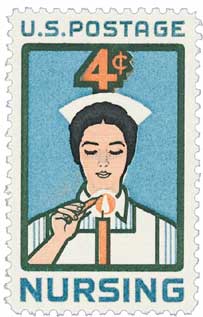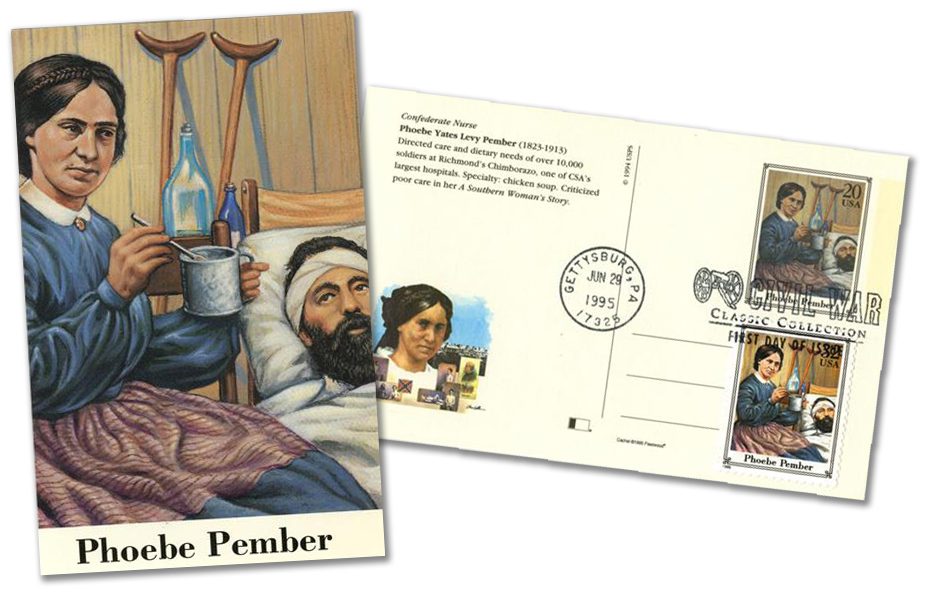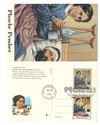
# UX217 - 1995 32c P.Y. Pember
Phoebe Yates Levy Pember was born on August 18, 1823, in Charleston, South Carolina. During the Civil War, she directed the care and dietary needs of over 15,000 soldiers at Richmond’s Chimborazo, one of the CSA’s largest hospitals. She later recounted her experiences in her memoir, A Southern Woman’s Story. Pember came from a wealthy family, though they suffered some financial issues and moved to Savannah, Georgia in the 1840s. Pember received some education before getting married in 1856. However, her husband died in 1861, leaving Pember a 38-year-old widow. She lived with her parents for a time, but grew unhappy with the inactivity of home life. By this time, the Civil War had erupted, and both sides of the conflict needed all the help they could get, but especially in the South. As the men marched off to war, women quickly learned to manage plantations, work in factories, and sew uniforms. Chimborazo Hospital in Richmond, Virginia was one such example of their efforts. Run almost entirely by women, it was the largest military hospital in the world at the time, treating more than 76,000 men. In December 1862, Pember reported to the hospital to serve as chief matron. For more than two years, she successfully managed one of the hospitals five divisions. Like many other Civil War nurses, Pember faced numerous professional barriers and regularly endured insults from those who believed that no respectable woman should minister to the needs of wounded men. Highly competent and strong-minded, she continued to care for them despite these objections. The hospital often lacked enough food, medicine, and other essential supplies. The best Pember and her staff could often offer was kindness and companionship, especially to those suffering from fatal wounds. Pember was also in charge of rationing the whiskey, which was considered an important medicine at that time. Pember carried a pistol to protect herself and the whiskey, as young surgeons, among others, often tried to steal it. Pember remained at the hospital until after General Lee’s surrender in April 1865. After the war she wrote an account of her wartime nursing experiences. Initially they were printed in The Cosmopolite magazine as “Reminiscences of a Southern Hospital, by its Matron.” These stories were then collected in a book, A Southern Woman’s Story: Life in Confederate Richmond in 1879. Rated as “one of the very best Confederate memoirs,” it provided a vivid account of the conditions in major Confederate hospitals and painted a portrait of the common soldier. Pember traveled the US and Europe after the Civil War and died on March 4, 1913. At one time, her childhood home was made into a bed and breakfast.Birth of Phoebe Pember





Phoebe Yates Levy Pember was born on August 18, 1823, in Charleston, South Carolina. During the Civil War, she directed the care and dietary needs of over 15,000 soldiers at Richmond’s Chimborazo, one of the CSA’s largest hospitals. She later recounted her experiences in her memoir, A Southern Woman’s Story. Pember came from a wealthy family, though they suffered some financial issues and moved to Savannah, Georgia in the 1840s. Pember received some education before getting married in 1856. However, her husband died in 1861, leaving Pember a 38-year-old widow. She lived with her parents for a time, but grew unhappy with the inactivity of home life. By this time, the Civil War had erupted, and both sides of the conflict needed all the help they could get, but especially in the South. As the men marched off to war, women quickly learned to manage plantations, work in factories, and sew uniforms. Chimborazo Hospital in Richmond, Virginia was one such example of their efforts. Run almost entirely by women, it was the largest military hospital in the world at the time, treating more than 76,000 men. In December 1862, Pember reported to the hospital to serve as chief matron. For more than two years, she successfully managed one of the hospitals five divisions. Like many other Civil War nurses, Pember faced numerous professional barriers and regularly endured insults from those who believed that no respectable woman should minister to the needs of wounded men. Highly competent and strong-minded, she continued to care for them despite these objections. The hospital often lacked enough food, medicine, and other essential supplies. The best Pember and her staff could often offer was kindness and companionship, especially to those suffering from fatal wounds. Pember was also in charge of rationing the whiskey, which was considered an important medicine at that time. Pember carried a pistol to protect herself and the whiskey, as young surgeons, among others, often tried to steal it. Pember remained at the hospital until after General Lee’s surrender in April 1865. After the war she wrote an account of her wartime nursing experiences. Initially they were printed in The Cosmopolite magazine as “Reminiscences of a Southern Hospital, by its Matron.” These stories were then collected in a book, A Southern Woman’s Story: Life in Confederate Richmond in 1879. Rated as “one of the very best Confederate memoirs,” it provided a vivid account of the conditions in major Confederate hospitals and painted a portrait of the common soldier. Pember traveled the US and Europe after the Civil War and died on March 4, 1913. At one time, her childhood home was made into a bed and breakfast.Birth of Phoebe Pember

















